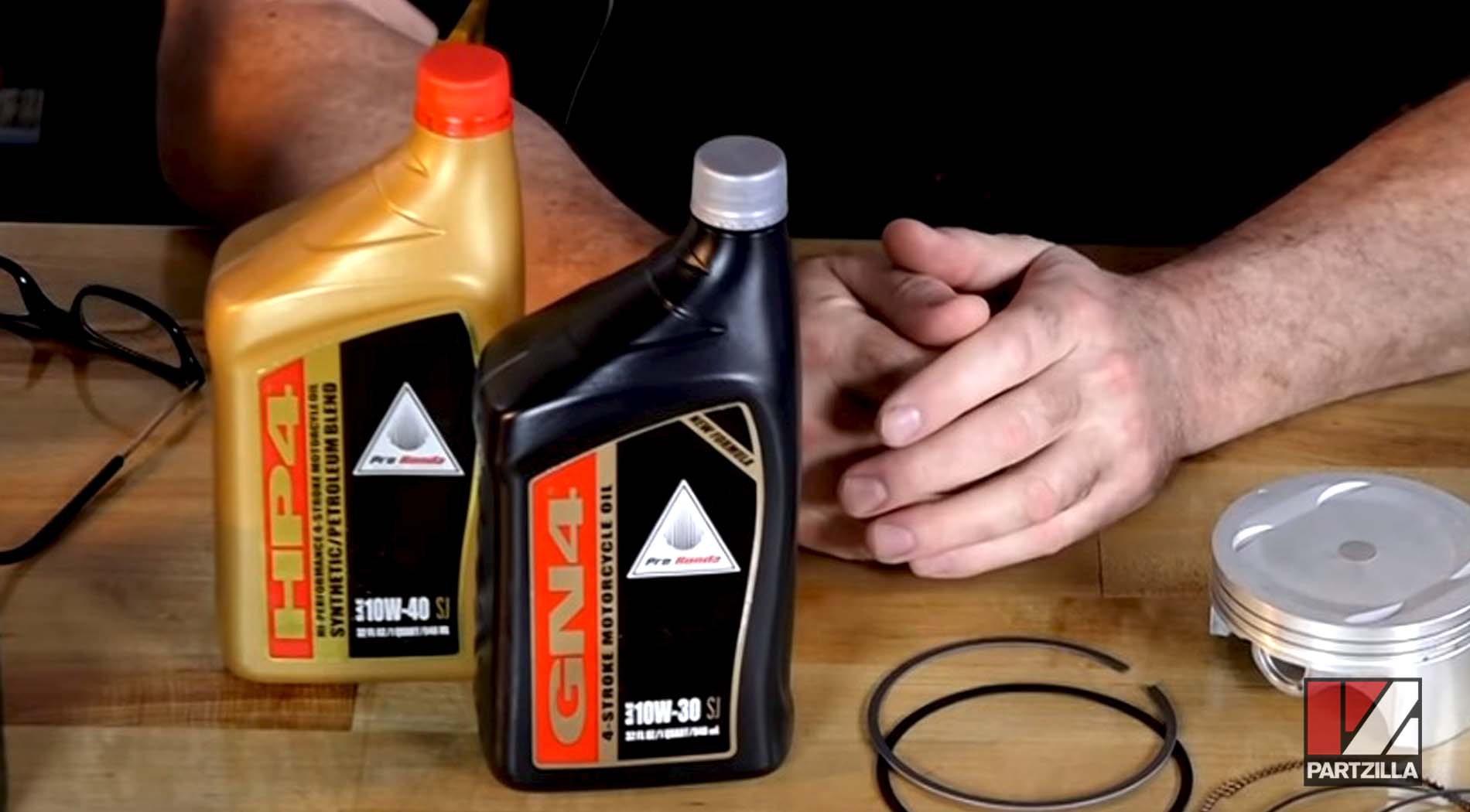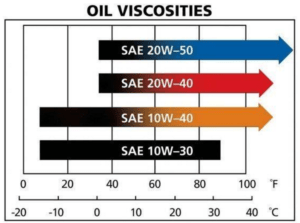Choosing the right motor oil can be confusing. Two popular options are 10W30 and 10W40.
Understanding the differences between these two oils is crucial for your vehicle’s performance. Motor oil plays a key role in lubricating and protecting your engine. The numbers in 10W30 and 10W40 represent the oil’s viscosity or thickness. This affects how the oil flows at different temperatures.
Knowing which oil suits your car can help maintain engine health and efficiency. In this comparison, we will explore the features, benefits, and ideal uses for 10W30 and 10W40. This will help you make an informed decision for your vehicle.

Credit: www.partzilla.com
Introduction To Motor Oils
Motor oils are vital for the smooth operation of engines. They reduce friction, clean engine parts, and enhance performance. Choosing the right motor oil is crucial for your vehicle’s health. This article covers the differences between 10W30 and 10W40 motor oils.
Importance Of Motor Oil
Motor oil lubricates engine parts, reducing wear and tear. It keeps the engine clean by removing dirt and sludge. It also improves fuel efficiency and reduces emissions.
Using the right motor oil helps in maintaining the engine’s lifespan. It ensures the engine runs smoothly under various conditions.
Basic Oil Specifications
Motor oils have different grades, indicated by numbers. These numbers represent the oil’s viscosity. Viscosity is the oil’s resistance to flow.
For example, 10W30 and 10W40 are multi-grade oils. The “10W” indicates the oil’s viscosity at cold temperatures. The numbers “30” and “40” show the viscosity at high temperatures.
| Oil Grade | Viscosity at Cold Temperature | Viscosity at High Temperature |
|---|---|---|
| 10W30 | 10W | 30 |
| 10W40 | 10W | 40 |
10W30 is suitable for moderate temperatures. It provides better fuel efficiency. 10W40 is ideal for higher temperatures. It offers extra protection for high-performance engines.

Credit: axleadvisor.com
Understanding Oil Viscosity
Choosing the right oil for your vehicle is crucial. Understanding oil viscosity helps make an informed decision. It determines how well the oil performs under different temperatures. Let’s dive into the details of oil viscosity.
What Is Viscosity?
Viscosity measures a fluid’s resistance to flow. Think of it as the oil’s thickness. Lower viscosity means thinner oil. Higher viscosity means thicker oil. Proper viscosity ensures the engine runs smoothly.
Viscosity Grades Explained
Viscosity grades show how oil behaves at different temperatures. The Society of Automotive Engineers (SAE) created these grades. For example, 10W30 and 10W40 are common grades. The first number, followed by ‘W’, indicates the oil’s viscosity in cold temperatures. The second number shows the oil’s viscosity at high temperatures.
10W30 oil has a lower high-temperature viscosity than 10W40. Thinner oil flows easier at higher temperatures. Thicker oil may provide better protection under high stress.
Choosing between 10W30 and 10W40 depends on your vehicle’s needs. Consult your vehicle’s manual for the best recommendation. Make sure the oil matches your driving conditions and climate.
10w30 Motor Oil
Motor oil plays a crucial role in maintaining your vehicle’s engine. Among the various options available, 10W30 motor oil stands out for its unique properties and benefits. This type of oil is popular among vehicle owners due to its versatility and performance.
Characteristics Of 10w30
10W30 motor oil has a viscosity rating of 10 in cold temperatures and 30 in hot temperatures. This means it flows well in both cold and warm conditions. It ensures proper lubrication during engine start-up in cold weather. It also maintains stability and thickness when the engine is hot. This balance makes it suitable for a range of climates.
Best Uses For 10w30
10W30 motor oil is ideal for many types of vehicles. It works well in cars, trucks, and motorcycles. It is especially good for engines that face moderate to heavy loads. This oil is often recommended for older engines. It helps reduce wear and tear, extending the engine’s life. It is also a good choice for regions with moderate temperature variations. This makes it a versatile and reliable option for many drivers.

Credit: www.cb500x.com
10w40 Motor Oil
Choosing the right motor oil can be challenging. The type of oil can impact your engine’s performance. One popular option is 10W40 motor oil. This oil is well-known for its versatility and performance in various weather conditions. Let’s dive into the details of 10W40 motor oil.
Characteristics Of 10w40
10W40 motor oil has specific features that make it unique. Here’s a breakdown of its characteristics:
| Characteristic | Details |
|---|---|
| Viscosity Rating | 10W (winter) and 40 (high temp) |
| Temperature Range | Performs well in both cold and hot climates |
| Engine Protection | Protects against wear and tear |
| Oil Type | Available in synthetic, semi-synthetic, and conventional |
Best Uses For 10w40
10W40 motor oil is suitable for a range of uses. Here are some of the best applications:
- Older Engines: Ideal for engines with higher mileage
- Motorcycles: Great for high-performance bikes
- Hot Climates: Performs well in higher temperatures
- Heavy-Duty Vehicles: Suitable for trucks and SUVs
This oil offers great protection and efficiency, making it a popular choice for many vehicle types.
Performance Comparison
Choosing between 10W30 and 10W40 motor oils can be confusing. Understanding their performance differences is key. Let’s compare their performance in different conditions.
Cold Weather Performance
Both 10W30 and 10W40 oils perform well in cold weather. The “10W” in their names indicates they have the same viscosity at low temperatures. This means both oils will flow equally well during cold starts.
Consider using either oil if you live in a cold climate. They provide similar protection during engine start-up.
High Temperature Performance
The difference between 10W30 and 10W40 oils becomes clear at high temperatures. The second number in their names indicates their viscosity at higher temperatures.
| Oil Type | High Temperature Viscosity |
|---|---|
| 10W30 | Thinner at high temps |
| 10W40 | Thicker at high temps |
10W40 provides better protection in hot climates. Its higher viscosity helps reduce engine wear. Choose 10W40 if you drive in very hot conditions or tow heavy loads.
10W30 is suitable for moderate temperatures. It helps improve fuel efficiency due to its lower viscosity.
Impact On Engine Wear
Choosing the right oil affects engine wear. Two common options are 10W30 and 10W40. Both oils have unique characteristics. Their performance in reducing engine wear differs.
Protection Against Wear
10W30 oil performs well in moderate temperatures. It provides decent protection against wear. This oil flows easily at low temperatures. It ensures the engine parts are well-lubricated during cold starts.
10W40, on the other hand, is thicker at high temperatures. This means better protection in hot weather. It maintains a stable film on engine parts. This reduces metal-to-metal contact. This reduces wear and extends the engine’s life.
Longevity Of Engine Parts
Using the correct oil extends engine life. 10W30 is suitable for newer engines. These engines have tighter tolerances. The thinner oil flows better and reaches all parts quickly. This reduces wear over time.
Older engines benefit from 10W40. These engines have looser tolerances. The thicker oil provides better sealing. This reduces oil consumption and increases part longevity. It also helps maintain compression, improving overall performance.
Both oils protect engines. The choice depends on the engine type and operating conditions. Selecting the right oil ensures your engine runs smoothly and lasts longer.
Fuel Efficiency Considerations
Choosing the right motor oil impacts your vehicle’s performance. Among the various factors, fuel efficiency stands out. The type of oil you use can affect your fuel consumption. This is especially true for 10W30 and 10W40 oils. Let’s dive into how these oils influence fuel efficiency.
Impact On Fuel Consumption
10W30 oil has a lower viscosity than 10W40. This means it flows more easily. Easier flow reduces the engine’s workload. Less work means better fuel economy. Lower viscosity oils generally offer better fuel efficiency.
10W40 oil is thicker. It provides better protection in high temperatures. But, the engine has to work harder to pump it. This increased effort can lead to higher fuel consumption. So, while it protects well, it may not be the best for fuel savings.
Balancing Efficiency And Protection
Choosing the right oil means balancing fuel efficiency and engine protection. 10W30 is often better for fuel economy. But, if you drive in hot climates, 10W40 offers better protection. The key is to consider your driving conditions.
For short trips or moderate climates, 10W30 is ideal. It provides good protection and helps you save on fuel. In extreme heat or heavy towing, 10W40 may be better. It protects the engine under stress. Always consult your vehicle’s manual for the best choice.
Choosing The Right Oil For Your Engine
Choosing the right oil for your engine is crucial. It ensures optimal performance and longevity. Two common oil types are 10W30 and 10W40. Both have unique properties and uses. Understanding these can help you make an informed decision.
Manufacturer Recommendations
Always follow the manufacturer’s recommendations. Your car’s manual provides the best advice. It specifies the oil type and viscosity required. This ensures your engine runs smoothly. Using the wrong oil can lead to engine damage and reduced efficiency.
Here is a simple table for reference:
| Oil Type | Recommended Temperature Range |
|---|---|
| 10W30 | -18°C to 30°C |
| 10W40 | -18°C to 40°C |
Personal Driving Conditions
Your personal driving conditions also play a role. Consider the climate you drive in. For cold weather, 10W30 might be better. It flows more easily at low temperatures. In contrast, 10W40 is thicker. It is ideal for warmer climates and high-performance engines.
Think about your driving style. Do you drive mostly in the city or on highways? City driving involves frequent stops and starts. This can be hard on your engine. 10W40 offers better protection in these conditions. For long-distance driving, 10W30 can be sufficient.
In summary, consider both the manufacturer’s recommendations and your personal driving conditions. This will help you choose the right oil for your engine.
Common Myths And Misconceptions
When comparing 10W30 and 10W40 motor oils, many drivers hold onto certain myths. These misconceptions can lead to improper oil choices. It is important to clear up these common misunderstandings to ensure the best performance for your vehicle.
Debunking Common Beliefs
Many people think 10W30 and 10W40 are the same. This is not true. The numbers indicate different viscosities, meaning their thickness and flow characteristics vary.
Another belief is that 10W40 is always better for older engines. While it is thicker and may help some engines, it is not a one-size-fits-all solution. Always consult your vehicle’s manual.
Some drivers believe using thicker oil will improve performance. This is also a myth. Using oil that is too thick can strain the engine, leading to wear and tear.
Expert Opinions
Experts stress the importance of following manufacturer recommendations. They suggest using the oil grade specified in the vehicle’s manual. This ensures optimal performance and longevity.
Automotive professionals also note that both 10W30 and 10W40 have their places. The choice depends on engine design, climate, and driving conditions. For instance, 10W30 is often preferred in colder climates, while 10W40 may be better in warmer regions.
In summary, understanding these common myths can help you make an informed decision. Always rely on expert advice and manufacturer guidelines to choose the right oil for your vehicle.
Frequently Asked Questions
What Is The Main Difference Between 10w30 And 10w40?
The main difference is their viscosity at high temperatures. 10W40 is thicker than 10W30.
Which Oil Is Better For Hot Climates?
10W40 is better for hot climates. It provides better protection at higher temperatures.
Can I Mix 10w30 And 10w40 Oil?
Yes, you can mix them. Both oils are compatible and will work together.
Is 10w30 Suitable For Older Engines?
Yes, 10W30 is good for older engines. It offers good protection and performance.
Does 10w40 Improve Fuel Efficiency?
No, 10W40 does not improve fuel efficiency. It is thicker and can slightly reduce fuel economy.
Conclusion
Choosing between 10W30 and 10W40 depends on your vehicle’s needs. 10W30 works well in moderate climates. It offers good fuel efficiency. 10W40 is better for hotter temperatures. It provides excellent protection. Both oils have their benefits. Consider your engine’s condition and driving conditions.
Consult your vehicle’s manual for the best choice. Proper oil ensures engine longevity. Make informed decisions for optimal performance. Keep your engine running smoothly with the right oil.

















